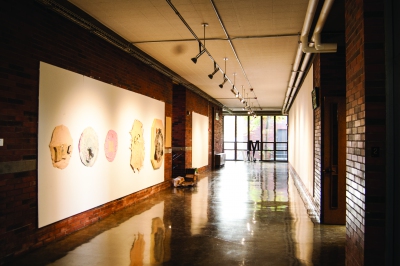Summer heat turns Michaelson and Randall into ‘brick ovens’

The lack of air conditioning makes it difficult for summer classes to be held in Michaelson and Randall halls.
October 22, 2015
A teacher’s office is like a second home. They spend more time in their office than anywhere else on campus. Because of this, it’s imperative that faculty make their offices feel more comfortable.
However, in the summer, it’s sometimes difficult to achieve that environment when the building doesn’t have air conditioning and outside temperatures climb into triple-digits.
Such is the case with Michaelson and Randall halls.
“You get a week of hot weather, and it turns into a brick oven,” said Ethan Bergman, associate dean and professor of food science and nutrition, who has had an office in Michaelson for almost 20 years.
Central’s facilities management recognized the issue in early fall 2014.
They made a recommendation that classes and offices be relocated away from Michaelson until air conditioning units could be installed based on that summer’s complaints.
The recommendation was denied by the departments.
“We figured we have less than a million dollars…to do it right could cost anywhere from four to five million,” said Mike Moon, director of Facilities Maintenance and Operations.
Moon added that Facilities Management doesn’t feel they have enough funds to update Michaelson’s air conditioning system at this time.
The budget necessary to complete the renovation comes from the Minor Works Preservation funding designated to Central by the Washington state legislature.
The money was released in early September.
Once Central’s budget is finalized, it will let the departments and Facilities Management know if the air conditioning projects are feasible.
The actual cost and due date of the projects depend on the designs of the remodeled buildings. Building designs are in the works and there is no due date at this time.
“The projects need to be paid for and completed by June 30, 2017,” Moon said.
The one exception is Samuelson, which is a four-year project.
Facilities Management has many other major projects they are trying to finish, as well as three to four smaller projects that cost $4 to $5 million a piece.
“Ultimately we need to have the building remodeled… air conditioned and update the spaces,” said Bergman he also said. “The building has been functional for years and has educated a lot of students, however, it’s time.”
Michaelson Hall is the only building that the Food Science and Nutrition department can hold specific classes in during the summer quarter. If they wanted to offer a paramedics or foods lab during the term, Michaelson is the only building they could offer the courses in.
Randall Hall also experienced the heat wave issue last quarter, however not to the same extent as Michaelson.
“In the week leading up to the heat wave, I was worried that the room would be so hot that it might pose health risks for the students…” said Rachel Kirk, assistant professor in the art department. “The conditions of 100+ degrees outside perhaps made us feel a little lethargic, but not enough to really affect our performance.”
Kirk, in her first year teaching at Central, taught a class of ten in Randall Hall last summer quarter.
“On warm days, we open windows in the hallways and have really large industrial fans positioned in strategic places to help keep the air circulating,” Kirk said. “Right before the hottest days of the heat wave this past summer, some dishonest person stole several of those industrial fans.”

